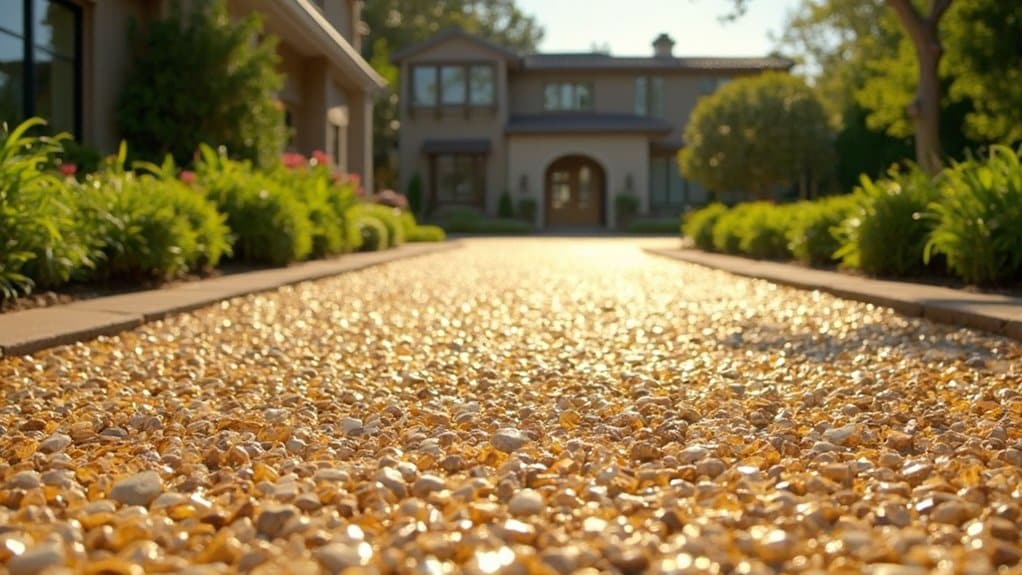Common myths about resin-bound gravel simply don't hold up. Far from being slippery, it offers excellent grip in British weather, including heavy rain. While the initial cost might seem steep, it's actually quite economical over time – you'll spend far less on upkeep than with traditional gravel or concrete. Think of it like a quality pair of boots: costlier upfront but lasting for years.
Installation worries? A properly laid resin surface handles everything from freezing winters to scorching summers. It works brilliantly for driveways, garden paths and patios whilst being fully permeable – meaning no more puddles after a downpour. You can choose from countless colour combinations to match your property, and it's environmentally sound to boot.
Key Takeaways
Resin-bound gravel offers superb grip – you won't slip and slide about, even during our notorious British downpours.
Whilst costs vary across regions, it's worth getting the professionals in. Think of it like laying a kitchen worktop – proper installation ensures it lasts.
A quick pressure wash now and then keeps the surface looking fresh and grippy, much like cleaning your patio.
You're spoilt for choice with over 40 colours and stone sizes – from warm honey tones for period properties to sleek greys for modern homes.
Excellent for the environment too. The surface lets rainwater drain naturally (goodbye, puddles!), and uses recycled materials, helping your local wildlife thrive.
Misconceptions About Slipperiness and Safety

Resin-bound gravel surfaces offer excellent grip, contrary to common worries about slipperiness. The rough texture provides reliable traction, particularly in Britain's rainy weather. Additionally, their permeable surface aids in effective water management, reducing the risk of slipping during wet conditions. For steep driveways, anti-slip additives can boost safety further. The mix of stone aggregates creates a naturally coarse surface that outperforms traditional tarmac for grip. Regular maintenance with a pressure washer keeps the surface slip-resistant. Unlike what many think, these surfaces handle wet weather well – a crucial benefit for UK homes and businesses. Higher quality decorative aggregates significantly enhance the durability and performance of resin-bound surfaces. Proper installation by qualified contractors ensures a safe, attractive surface that lasts.
Understanding the Cost and Value of Resin-Bound Gravel
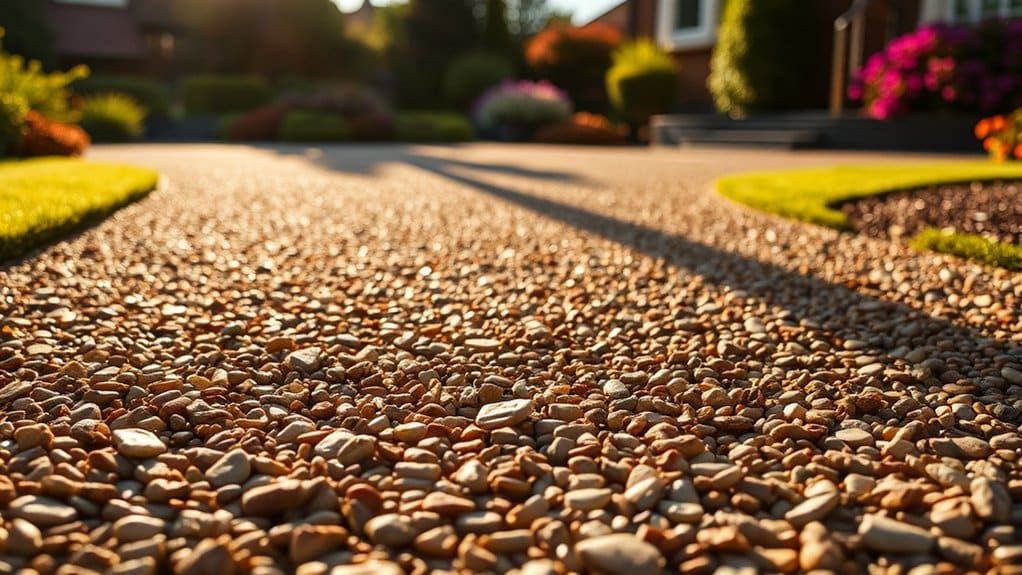
Cost and Value of Resin-Bound Gravel
The price of resin-bound gravel varies significantly, with several key factors affecting your investment:
- Material Costs: Quality resin and aggregate prices differ – expect to pay £40-60 per square metre for materials alone.
- Installation Requirements: Sloped driveways or poor ground conditions need extra preparation, pushing costs up. The estimated cost to install resin bonded gravel starts at $11.71 – $16.20 per square foot.
- Labour Rates: Installation costs range from £30-50 per square metre, depending on your location (London rates typically higher).
- Project Size: Larger areas, like car parks, often work out cheaper per square metre than small paths.
Despite higher upfront costs compared to tarmac or concrete, resin-bound gravel proves cost-effective long-term.
It's virtually maintenance-free, lasts 15-20 years when properly installed, and adds kerb appeal to your property.
Plus, it's fully permeable, meeting current planning requirements for sustainable drainage.
Installation and Durability Myths Explained
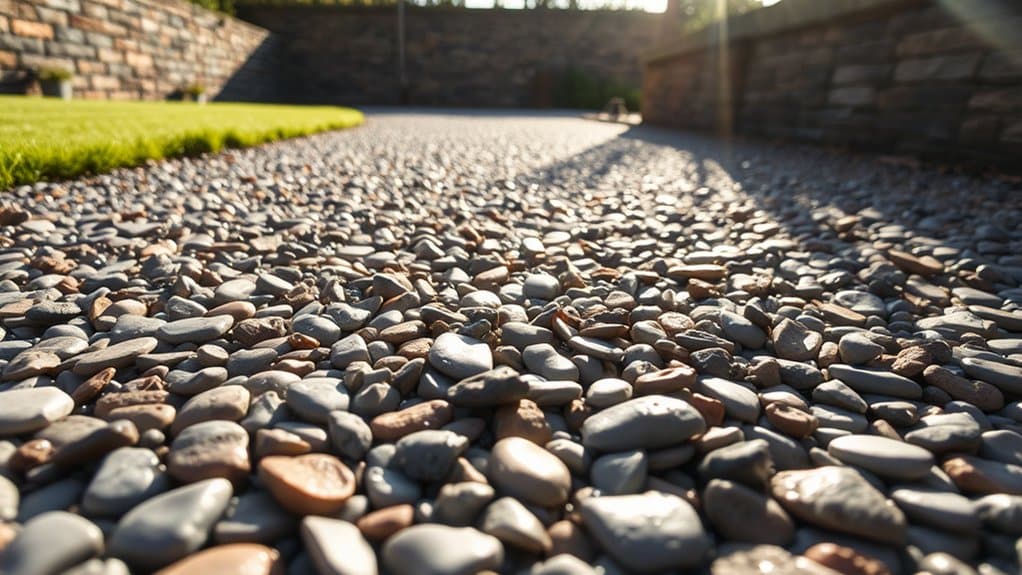
Resin-bound gravel installation isn't as simple as many believe. Whilst DIY attempts might seem tempting, proper installation demands expert knowledge and specific conditions.
The process requires:
- Precise mixing ratios
- Correct ground temperature
- Properly prepared sub-base
- Suitable weather conditions to ensure optimal adhesion
When done correctly, resin-bound surfaces offer remarkable durability:
- Withstand British weather extremes
- Last 15-20 years with proper maintenance
- Resist frost damage and UV exposure
- Handle heavy foot traffic without loose stones
Common mistakes like laying during wet weather or incorrect mixing can lead to surface failure, making professional installation worth the investment. Additionally, a resin-bound driveway's porous finish allows for effective water drainage, which is a significant advantage over resin-bonded alternatives and ensures long-lasting integrity.
Think of it like laying a kitchen worktop – whilst it looks straightforward, expertise ensures lasting results.
The system's true strength lies in its proper installation rather than the materials alone, much like a quality cup of tea needs the right brewing time, not just good leaves. Properly prepared sub-base construction is a critical factor that contributes to the longevity of the driveway.
Simple Installation Process
Installation Guide for Resin-Bound Gravel
Fitting resin-bound gravel might look simple, but proper installation ensures its longevity and performance. Follow these essential steps:
- Stable Base: Use either concrete or well-compacted MOT Type 1 aggregate. A wobbly base means a dodgy finish.
- Surface Prep: Much like painting a wall, your surface must be spotless. Remove any weeds, fill cracks and sweep away loose bits.
- Mixing Ratio: Getting the mix right is crucial – think of it like baking a cake. Too much or too little resin will spoil the job.
- Weather Watch: Choose a dry day for installation. Rain and resin don't mix, rather like oil and water. Ensure your sub-base is properly prepared to meet SUDS compliance for effective drainage.
Expert tip: If you're unsure about any step, it's worth getting a professional in – sorting out mistakes later will cost more than doing it right the first time.
Long-lasting Durability Features
Proper installation is crucial for maximising the lifespan of resin-bound gravel surfaces. When fitted correctly, these surfaces typically last beyond 20 years.
The robust resin bonding prevents cracking in harsh British weather, whilst UV protection maintains colour stability.
Regular maintenance is straightforward – a quick sweep and occasional thorough clean keep the surface in top condition. The surface naturally deters weeds, making upkeep even simpler.
With the right installation and basic care, you'll have a hardwearing, smart-looking surface that stands up to years of use.
Permeability and Drainage Misunderstandings
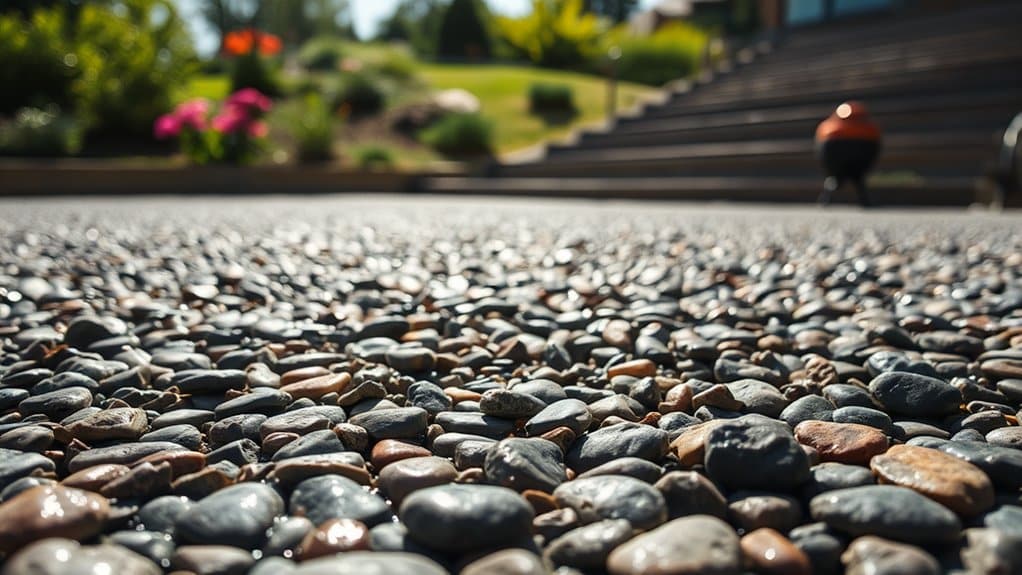
Common Drainage Myths: The Truth About Resin-Bound Gravel
Whilst many assume gravel surfaces lack proper drainage, resin-bound gravel proves exceptionally permeable. Think of it as a giant sponge for your driveway or garden path – water simply soaks straight through.
The system works brilliantly because:
- Rainwater filters naturally between stone particles, much like soil.
- The surface prevents puddles and reduces local flood risks.
- Professional installation ensures long-term drainage performance.
- The material meets UK sustainable drainage regulations (SuDS), helping manage storm water locally.
For best results, proper installation by qualified contractors is crucial.
When laid correctly, a resin-bound surface can handle typical British weather whilst keeping your outdoor space practical and puddle-free.
Aesthetic Flexibility and Customization Options
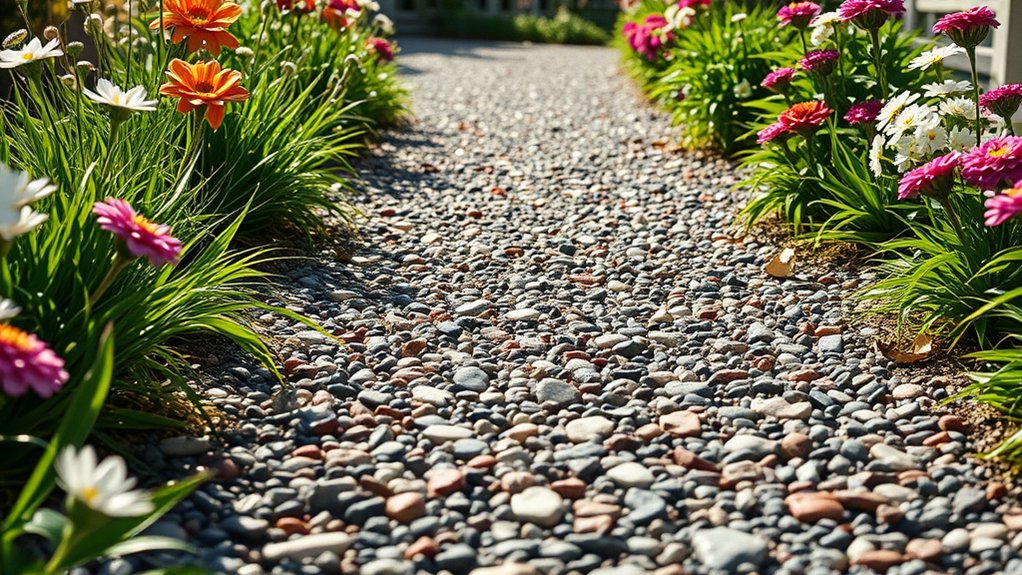
Resin-bound gravel delivers excellent design flexibility with countless colour and texture options to match any property style.
Choose from rich earth tones like Yorkshire Buff or sleek modern greys – popular amongst UK homeowners – through to bold statement colours.
The varied stone sizes create different textural finishes, from fine and smooth to more distinctive aggregate patterns, much like those seen in traditional British landscaping.
The system works brilliantly for both classic cottage driveways and contemporary urban spaces, adapting seamlessly to your property's character.
Wide Color Selection
The resin-bound gravel market offers more than 40 colours to suit any property.
From classic to contemporary, the extensive range includes:
- Natural tones: Beige and brown shades that blend seamlessly with garden landscapes
- Bold colours: Reds, blues and greens for striking driveways and paths
- Classic options: Greys, whites and blacks for modern, understated finishes
- Mixed blends: Combine colours to create unique patterns or zones
Whether matching existing brickwork or creating contrast with your garden, the colour options ensure your surface fits perfectly with your home's character.
Unique Textures Available
Resin-bound gravel delivers distinctive textures that transform outdoor spaces across Britain.
Different-sized aggregates create varied finishes, from fine, smooth surfaces perfect for driveways to bold, chunky layouts ideal for garden paths.
Mix and match textures to form eye-catching patterns – think classic herringbone or modern geometric designs.
Border options like brick or stone edging add a polished finish to any project.
The versatility means it works brilliantly with both period properties and contemporary builds.
This practical surface suits British weather conditions and maintains its appearance for years, making it a sound choice for homes and business properties alike.
Whether you're revamping a Victorian townhouse entrance or modernising a commercial car park, the range of textures available ensures a finish that fits.
Environmental Impact and Sustainability Beliefs
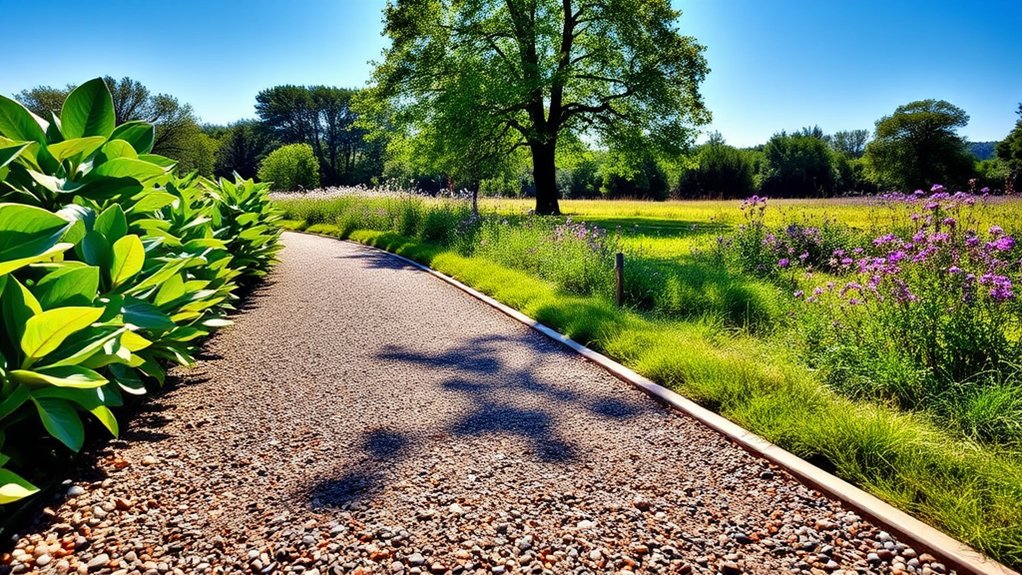
Environmental Benefits of Resin-Bound Gravel
Resin-bound gravel offers several key environmental advantages worth considering for your driveway:
- Drainage Performance: These surfaces let rainwater soak through naturally, helping prevent local flooding and meeting UK drainage regulations (SuDS).
- Uses Recycled Materials: Many suppliers now incorporate recycled glass and aggregates from local sources, cutting down on waste and transport emissions.
- Built to Last: A properly installed resin driveway typically lasts 15-20 years, meaning less frequent replacement than traditional surfaces like tarmac or loose gravel.
- Ground Protection: The bound surface keeps soil in place during heavy rain, protecting garden borders and local wildlife areas from wash-away.
Unlike traditional concrete driveways, resin-bound surfaces work with nature rather than against it.
They're particularly suited to Britain's wet climate and increasingly strict planning requirements for sustainable drainage.
Frequently Asked Questions
Can Resin-Bound Gravel Be Used for Driveways and Pathways?
Resin-bound gravel works brilliantly for both driveways and garden paths in the UK. It's tough enough to handle daily vehicle use, whilst looking far smarter than traditional loose gravel. Think of it as similar to Tarmac but with a more upmarket finish – perfect for everything from front drives to courtyard walkways. Proper installation from a qualified contractor ensures it stays permeable (essential for UK weather) and maintains its smart appearance for years to come.
How Does Resin-Bound Gravel Compare to Traditional Concrete Surfaces?
Resin-bound gravel offers a more attractive finish than standard concrete. Whilst the fitting requires specialist installation, it provides countless colour and pattern options. Traditional concrete might be simpler to lay but lacks the design flexibility and visual charm of resin-bound surfaces.
Is Resin-Bound Gravel Suitable for Residential and Commercial Use?
Resin-bound gravel works brilliantly for both homes and businesses across the UK. Whether it's a smart driveway in Manchester or a shop frontage in Leeds, the surface delivers lasting results. Whilst fitting requires proper expertise, you'll get a tough, fuss-free finish that looks smart and handles our British weather well, thanks to its excellent drainage.
What Is the Lifespan of Resin-Bound Gravel Installations?
Resin-bound gravel surfaces typically last 20-30 years when properly fitted and maintained. Much like a well-kept driveway, regular cleaning and prompt repair of any damage will help your resin surface reach its full lifespan. The durability of these installations makes them a practical choice for British homes, particularly given our varied weather conditions.
How Do Temperature Extremes Affect Resin-Bound Gravel Performance?
Temperature extremes significantly affect resin-bound gravel surfaces in the UK. Scorching summer days and harsh winter frosts can impact the material's stability and longevity. A well-installed surface should cope with our typical British weather swings, from -5°C winter mornings to 30°C summer afternoons, without cracking or becoming uneven. Proper installation and high-quality materials are crucial for maintaining a durable, weatherproof finish throughout the seasons.
Conclusion
Resin-bound gravel remains one of the most misunderstood surfacing options in Britain. Many homeowners question its reliability for UK weather, cost-effectiveness and eco-credentials. Yet the facts paint a different picture. Much like traditional block paving or concrete, resin-bound gravel serves as a practical choice for driveways and garden paths, offering both durability and kerb appeal. Understanding the reality behind common myths helps property owners make better-informed choices about this versatile surface option.
